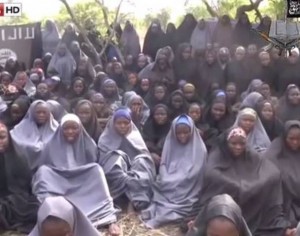News
60 women, girls escape Boko Haram captivity: How politics complicates Nigeria’s crisis
About 60 women and girls reportedly kidnapped last month by Boko Haram insurgents from villages near Chibok in northeastern Nigeria have escaped from their captors, state officials and local vigilante sources said Sunday.

Agence France-Presse reports that local vigilante leader Abbas Gava said he received information from colleagues on the ground that about 63 women and girls kidnapped by insurgents during a series of raids on a cluster of villages in the remote Damboa local government area of northeastern Borno state escaped from captivity and returned to their families late Friday.
The report was confirmed by unnamed senior security officials in Borno state, according to AFP.
Gava said the abductees escaped from captivity while their captors went out to attack a military base in Damboa Friday night.
The Punch reports that local youth vigilante member Adamu Suleiman also said the women “took to their heels when their captors left them at the camp to go for a major operation.”
Military spokesman Maj. Gen. Chris Olukolade told reporters on Saturday that Boko Haram fighters launched an attack on a military base in Damboa armed with automatic weapons and rocket-propelled grenades.
Five soldiers, a senior military officer and 53 Boko Haram fighters were killed in the firefight, according to Olukolade.
A state official who spoke with The Punch said some of the women returned home to their families while some were picked up in the bushes near Adamawa after having lost their way.
The women and girls were among 91 civilians, including young children, reportedly kidnapped late June by the insurgents during attacks on a cluster of villages in the remote Damboa Local Government area of Borno state.
However, the over 200 Chibok girls abducted in April remain in captivity, although a few reportedly escaped soon after they were kidnapped.
Commentary
Following reports in the Nigeria media late June that over 60 women were abducted in the region, a federal government spokesman, Mike Omeri, denied the reports bluntly at a news conference in Abuja, saying, “there were no sufficient facts on the alleged abduction. We hereby wish to state that based on available facts before us there was no abduction of 60 persons in Borno state.”
Following claims that the women reported as having been kidnapped were members of nomadic Fulani clans who had moved away from the area as part of their routine annual migration, Borno state’s Gov. Kashim Shettima ordered a probe into the alleged abduction.
The panel of inquiry had not submitted its report when the news came that the women had escaped captivity.
The escape story is eerily reminiscent of the story following the Chibok kidnap in April that most of the girls had returned home. Nigeria’s first lady, Dame Patience Jonathan, had claimed at the time that the Chibok kidnap story was fabricated to embarrass her husband’s government.
Her protesting cry in Nigerian patois, “There is God ooo!” went viral on Nigerian Twittersphere.
The confusion over the facts of the latest Boko Haram abduction provides an insight into the political rivalry issues obstructing the fight against Boko Haram.
Shettima was elected to office on the platform of the opposition All Nigeria’s People Party. He is also one of opposition state governors that are members of the All Progressive Congress, a grand opposition coalition to oust the ruling People’s Democratic Party in the 2015 general election.
There is reason to believe that the lackadaisical response of the federal authorities and its security forces to the early warnings of the April attack that led to the kidnap of the Chibok girls was due partly to the belief among federal government officials that the opposition party state governor was fabricating stories of attacks and kidnaps to embarrass the federal government.
Had the Chibok kidnap not created an international uproar, the government of President Goodluck Jonathan would probably have ignored it under the conviction that his political opponents were engineering mischief to discredit his government ahead of the 2015 general election.
While it is true that there is a fifth column active in the Nigerian government supporting the Boko Haram insurgency as a way of discrediting the federal government, the circumstances of the vast historical, cultural and political chasm between northern Muslims and southern Christians contributes to paranoia that fosters wild conspiracy theories that have little foundation in facts.
Political-ethnic rivalry generates intense mutual suspicion and distrust that leads to time and effort wasting exchange of recriminations over the causes of the ongoing crisis.
While in recent times northern politicians have become vocal in claiming that the insurgency in the north is the result of poverty due to neglect of the north by the federal government, southern politicians accuse their northern counterparts of hypocrisy, pointing to the fact that the northern ruling elite have dominated power at the federal center for most of Nigeria’s post-colonial history.
Another aspect of recriminations over the crisis comes from questions being raised about why northern Muslim leaders who presumably have access to backchannel routes of engaging with Boko Haram for a peaceful resolution of the crisis have refused to intervene in the crisis.
The question was raised recently by the Concerned Muslim Professionals.
The group took the Sultan of Sokoto, Alhaji Sa’ad Abubakar III, the titular head of Muslims in the country, to task over the seeming aloofness of northern Muslim leaders in the crisis.
According to the leader of the CMP, Alhaji Mohammed Saidu, the failure of northern Muslim leaders to intervene is the reason why the insurgency persists.
Many southern Christians are quick to interpret the alleged silence of the northern Muslim leadership as evidence of collusion with northern politicians to use the Boko Haram crisis to destabilize Jonathan’s government.
But regardless of the truth in the allegations and counter-allegations, what is revealed is the fact that political power rivalry between the government and opposition groups is a major factor preventing concerted efforts to end the crisis.
